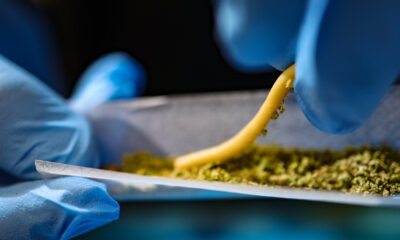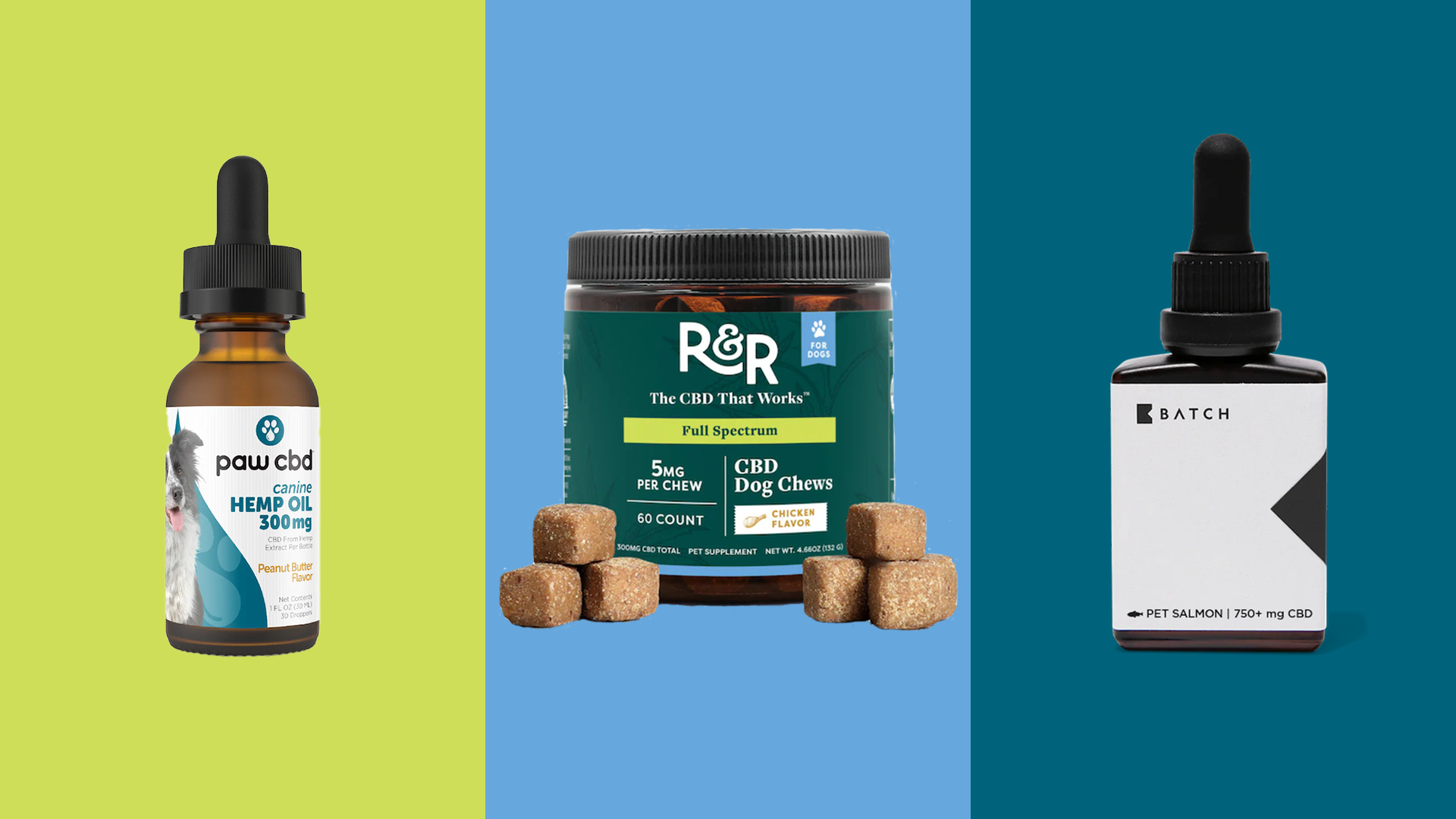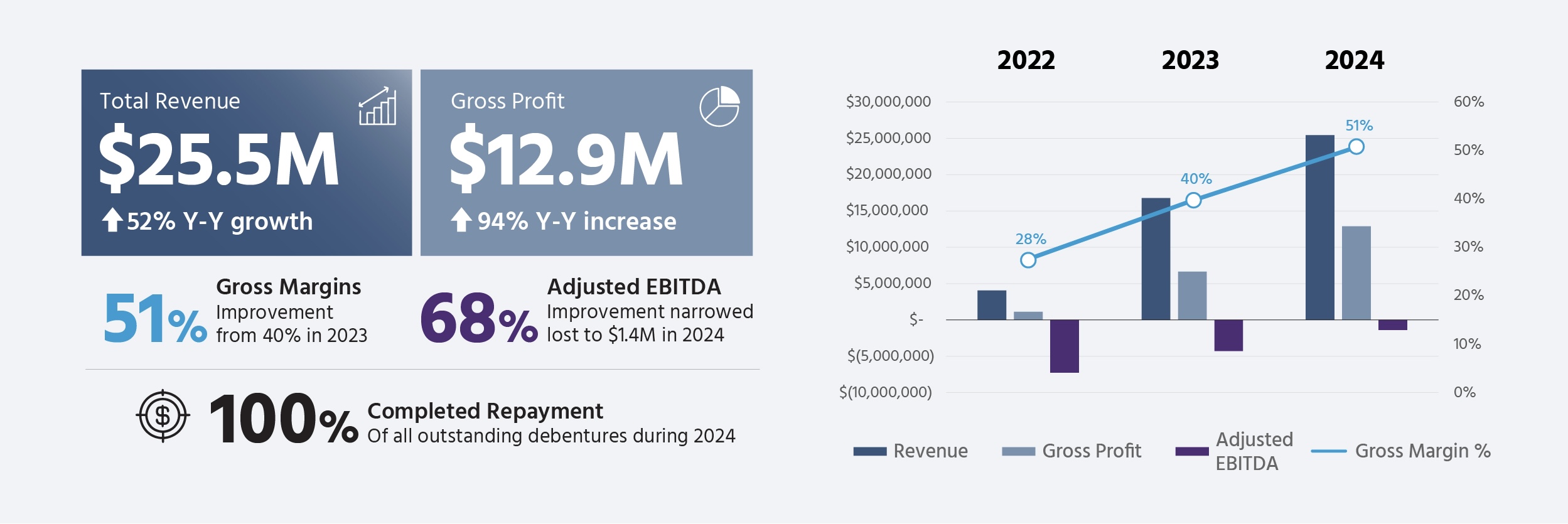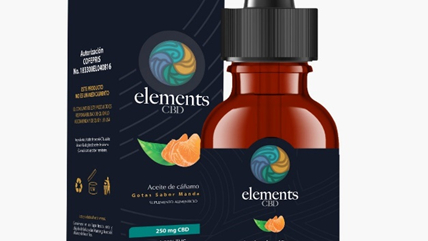Recommendations on the best CBD for dogs are made by Leafly’s Product Picks team after extensive research, internal debate, and expert consultation. If you buy through links on this page, we may earn a small commission.
Looking to help your pup chill out, manage pain, or ease anxiety during firework season? CBD for dogs has become a go-to option for pet parents seeking natural relief without the high. We’ve sniffed out the best CBD products for dogs, from tasty treats to tinctures, to help your furry friend feel their best.
A quick look at the best CBD for dogs
Best overall: Cornbread Hemp Full Spectrum CBD Oil for Pets
Best oil tincture: cbdMD Broad Spectrum CBD Dog Oil Tincture
Best chews: R&R Multifunctional CBD Dog Chews
Best for picky eaters: BATCH Pet CBD Oil Tincture
Best treat format: Dad Grass CBD Dog Bones
Best joint support: Medterra Pet Hemp Joint Support Chews
Best calming support: Honest Paws Calm CBD Bites for Dogs
Best digestive support: Lazarus Naturals CBD Dog Chews, Digestive Health
Best skin and allergy support: Charlotte’s Web Skin & Allergy Chews for Dogs
Best veterinary strength: ElleVet Hemp Oil for Dogs
Best senior dog support: CBD Dog Health Heal: CBD Oil for Dogs
| Brand | Product | Format | Flavor | CBD | Size/Amount | Price |
|---|---|---|---|---|---|---|
| Cornbread Hemp | Full Spectrum CBD Oil for Pets | Oil tincture | Corndog | 25mg | 30 mL | $49.99 |
| cbdMD | Broad Spectrum CBD Dog Oil Tincture | Oil tincture | Peanut Butter | 10, 25, or 50mg | 30 mL | $24.99 |
| R&R | Multifunctional CBD Dog Chews | Chews | Chicken | 5mg | 60 chews | $45.00 |
| BATCH | Pet CBD Oil Tincture | Oil Tincture | Bacon, Salmon, or Chicken | 12, 25, or 50mg | 30 mL | $35.00 |
| Dad Grass | CBD Dog Bones | Chews | Pumpkin | 4mg | 20 bones | $25.00 |
| Medterra | Pet Hemp Joint Support Chews | Chews | Peanut Butter | 10mg | 30 chews | $34.99 |
| Honest Paws | Calm CBD Bites for Dogs | Bites | Peanut Butter | 5mg | 30 bites | $28.47 |
| Lazarus Naturals | CBD Dog Chews, Digestive Health | Chews | Pumpkin | 10mg | 30 chews | $17.00 |
| Charlotte’s Web | Skin & Allergy Chews for Dogs | Chews | Chicken | 2.5mg | 30 or 60 chews | $19.99 |
| ElleVet | Hemp Oil for Dogs | Oil tincture | Flavorless | 2,100mg hemp extract per bottle | 15, 30, or 60 mL | $67.15 |
| CBD Dog Health | Heal: CBD Oil for Dogs | Oil tincture | Flavorless | 37mg | 30 mL | $84.99 |
How to use CBD for dogs
Pet owners turn to CBD products for dogs to help manage a variety of health and behavioral issues. Derived from hemp, cannabidiol (CBD) interacts with the endocannabinoid system—a network found in both humans and animals that helps regulate things like mood, pain, appetite, and immune response.
For dogs, this means CBD may help reduce anxiety during stressful situations like thunderstorms, fireworks, or vet visits, and may also be used to support mobility in aging pups with joint stiffness. Unlike THC, CBD won’t get your dog high, making it a popular option for pet relief when dosed correctly.
Using CBD for your dog typically involves administering a measured amount daily and consistently over time, most commonly through flavored treats, soft chews, or oil tinctures that can be dropped directly into their mouth or mixed into food. Many pet parents report seeing noticeable improvements in their dog’s demeanor, activity level, and overall comfort within a few days to a couple of weeks of beginning a CBD routine.
It’s always a good idea to consult with your veterinarian before starting any new supplement, especially if your dog is on medication or has underlying health conditions. With quality products and responsible use, CBD may be a helpful tool in a holistic approach to your dog’s wellness.
How to select the best CBD for dogs
When shopping for CBD products for your dog, it’s important to look for full- or broad-spectrum hemp extract like the ones on our list, which contain beneficial cannabinoids and terpenes without the THC buzz. Transparency with ingredients and dosing is key—the brands on this list offer third-party lab results (COAs) that confirm potency and screen for pesticides, heavy metals, and other nasties.
We looked for brands with clear dosing guidelines based on your dog’s weight, so you can confidently dial in the right amount for your pet. Some brands focus on organic ingredients and condition-specific formulas, while others offer flavor and potency options to meet your dog’s specific needs.
Whether your pup prefers peanut butter-flavored treats or you need a flavorless oil to add to meals, we sourced options for every taste and temperament. The selections in this list prioritize transparency and effectiveness because your dog deserves the same quality you’d expect for yourself.
Read on to find the best CBD for dogs of 2025.
The best CBD for dogs of 2025: Reviews and recommended products
Best overall: Cornbread Hemp
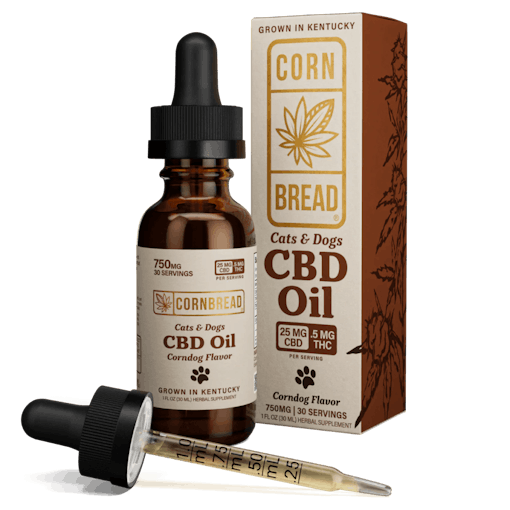
25mg CBD
Cornbread Hemp makes their hemp extract from USDA-organic, Kentucky-grown hemp flower, using only flower, rather than sticks & stems, to create a full-spectrum oil that’s rich in the cannabinoids and terpenes you want for effective support. We highly recommend their line of CBD oils for humans who want the best, most wholesome relief, and the same goes double for their pet formula for your furry friends.
30 mL | Corndog
You’ll find only organic MCT coconut oil, organic hemp flower extract, and vegan corndog flavoring in this formula. Pets that may stick up their noses at the flavors of a planty full-spectrum extract will come running for Cornbread Hemp’s vegan corndog flavoring. And Cornbread’s made dosing easy so you’ll be ready when they do—they recommend one full dropper of 25mg CBD for an 80lb dog, with clear markers on the dropper to reduce the dose by pet-size for a 19mg dose for 60lb dogs, a 13mg dose for 40lb dogs, and so on.
Best CBD oil: cbdMD
New customers get 25% off with code LEAFLY25.
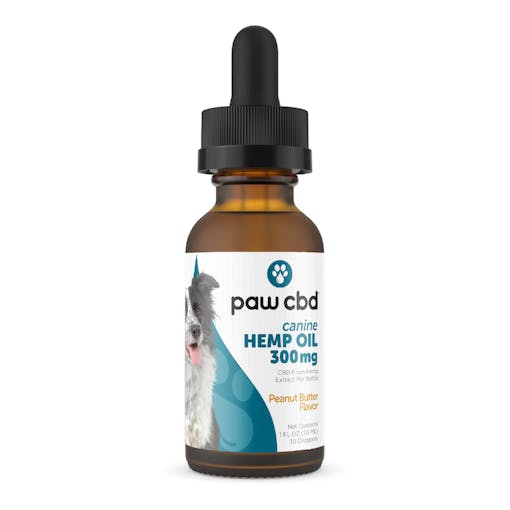
10, 25, or 50mg CBD
cbdMD brings their signature quality to CBD for dogs with their veterinarian-formulated Superior Broad Spectrum CBD Dog Oil. The high-quality hemp extract contains cannabinoids and additional terpenes to offer your dog whole-body benefits to help encourage calmness, relaxation, and mobility. Always third-party lab tested to ensure purity and quality, their formula is also vegan, gluten-free, and THC-free, as you’d expect from a broad-spectrum formula.
30 mL | Peanut Butter
The peanut butter flavor and oil format make this CBD simple to administer, and we love that it comes in three different strengths so you can easily match the right product to your dog’s size and particular needs. The 300mg strength oil for small–medium dogs contains 10mg CBD per 1 mL dropper, while the 1500mg strength oil contains 50mg CBD per 1 mL dropper, with the 750mg strength oil falling in between at 25mg CBD per 1 mL dropper.
Best CBD chews: R&R
Use code LEAFLY20 for 20% off your first purchase at checkout. This offer can be used with multi-product and subscription orders.
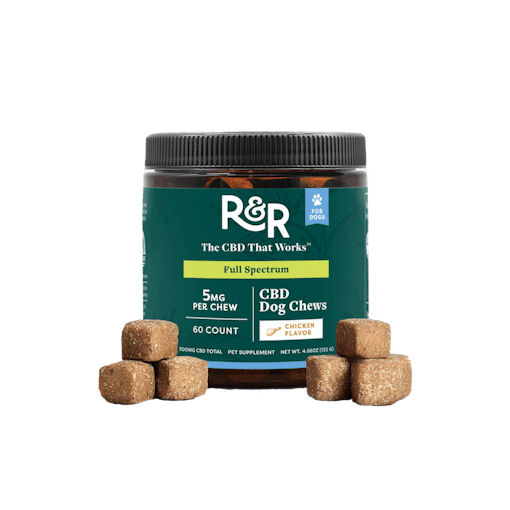
5mg CBD
These Multifunctional CBD Dog Chews from the hemp experts at R&R deliver 5mg CBD per piece in a tasty chew format that’s easy for your dog to love. Made with chicken liver & protein, sweet potato, flax seed, and high-quality, full-spectrum hemp extract, these chews will feel as familiar as your dog’s favorite treats, with the plant-powered benefits of CBD in every bite.
60 chews | Chicken
R&R recommends one chew for pets 25 lbs or less and two or more chews for pets over 26 lbs. CBD is most effective when taken consistently, so R&R advises it may take 5-7 days of daily dosing for your pet to experience the best results. Once CBD accumulates in the system, your dog may experience relief from pain and stress in as little as five minutes.
Best for picky eaters: BATCH
Use code LEAFLY for 20% off your order. Applies to both one-time purchases and subscriptions. One use per customer. No other restrictions.
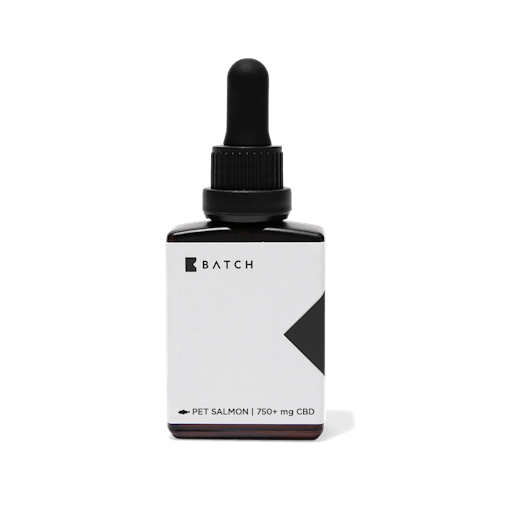
12mg, 25mg, or 50mg CBD
The review section for BATCH’s Pet CBD Oil Tincture is overflowing with stories and pictures of happy dogs whose owners have seen their daily lives improve while using the brand’s high-quality oil tincture. BATCH’s formulas for humans and pets are crafted in-house from 100% organic, Wisconsin-grown hemp plants, and the care they put into their products is on full display here.
30 mL | Bacon, Salmon, or Chicken
We were especially impressed with the personalization options for pet owners, making it easier to select the right formula for picky pets with specific taste preferences. BATCH’s pet oil comes in bacon, salmon, and chicken flavors, so you can serve up something you know your pooch will love. The oil also comes in three concentrations so you can easily select a CBD potency that works best for your animal’s size.
Best CBD treat: Dad Grass

4mg CBD
A CBD treat that helps cool dogs chill, CBD Dog Bones from Dad Grass contain 4mg CBD per bone for wholesome goodness that keeps tails wagging. Always lab-tested for purity and potency, these CBD Dog Bones are vegan, gluten-free, all-natural, and non-GMO so Fido can feel his best. Crafted with real pumpkin and organic, full-spectrum hemp oil, they’re made so dogs will love the taste and happily receive their daily dose of CBD to help with calming nerves and to encourage overall wellness.
20 bones | Pumpkin
Dad Grass recommends 1mg CBD per 10 lbs, so pet owners can easily scale up with one or more bones or break apart a single bone for littler guys. Leave it to Dad Grass to make a pet product that’s got as much style as substance—you can trust that their organic full-spectrum oil is the good stuff, and the classic bone shape brings major bag appeal for a price that’s right.
Best joint support: Medterra
Use code LEAFLY25 to get 25% off your one-time purchase.
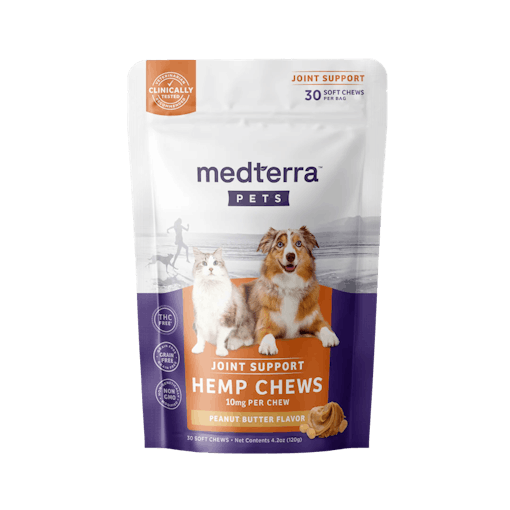
10mg CBD
For pet parents hoping to enhance their dog’s joint health and mobility, Medterra’s Pet Hemp Joint Support Chews are specially formulated for just that. 10mg of high-quality hemp extract is combined with joint-supporting ingredients like Glucosamine and MSM to help alleviate discomfort and promote healthy activity. The peanut butter chews allow for simple dosing with natural ingredients and a flavor that dogs will sit, stay, and come for.
30 chews | Peanut Butter
A detailed guide is provided on the back of the packaging, so the recommended dose for your dog is always close at hand. There’s guidance for both “Maintenance” and “Advanced Dosing” broken down by pet size, making it simple to adjust your dog’s daily dose based on their specific needs. With a long-standing reputation for effective CBD products for humans, Medterra makes sure they lend the same level of quality to your pets.
Best calming support: Honest Paws

5mg CBD
If your dog could use some extra help around fireworks, plane rides, or separation nerves, Honest Paws makes these Calm CBD Bites for Dogs to foster relaxation and support emotional balance. With their US-grown, organic, full-spectrum hemp extract, these bites can provide natural relief in an organic peanut butter flavor that’s popular with pets. If you’re unsure of whether your dog might prefer a treat format or an oil tincture, Honest Paws also bundles their Calm CBD Soft Chews with their Calm CBD Oil in the Peaceful Dog Bundle so you can test out which is a more effective administration method for your pet.
30 chews | Peanut Butter
Best digestive support: Lazarus Naturals
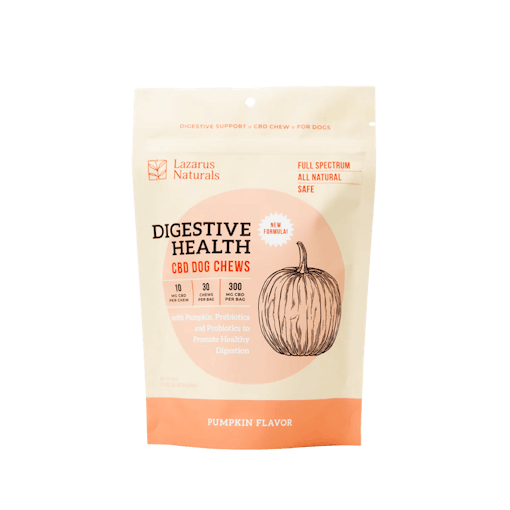
10mg CBD
Lazarus Naturals is a top producer of high-quality CBD products, with an Organic Pet CBD Tincture that comes highly recommended—but their CBD Dog Chews for Digestive Health are a real standout for their targeted approach to digestive support for dogs. In addition to full-spectrum hemp extract, the chews include pumpkin, prebiotics, and probiotics to help your furry friend feel their best.
30 chews | Pumpkin
Best skin and allergy support: Charlotte’s Web
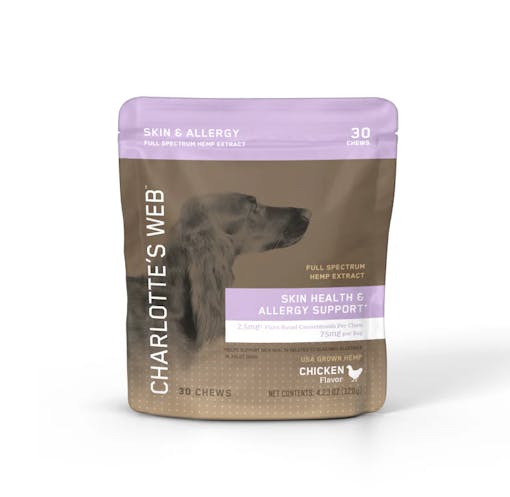
2.5mg CBD
Skin & Allergy Chews from Charlotte’s Web are formulated to help alleviate discomfort from itchy skin and seasonal allergies for dogs, including ingredients like Nettle Leaf, Marshmallow Root, and Fish Oil Concentrate, along with their full-spectrum, US-grown hemp extract. Pet owners share in reviews that they’ve seen an improvement with reduced scratching and paw-licking in their dogs. Wholesome ingredients and an easy-to-love chicken flavor make this a favorite for owners and pets alike.
30 or 60 chews | Chicken
Best veterinary strength: ElleVet
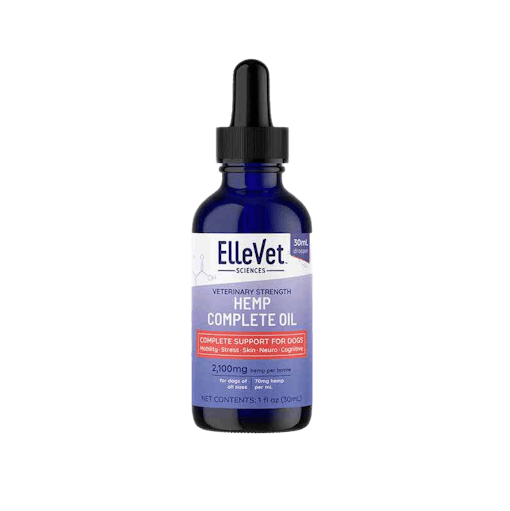
2,100mg hemp per bottle (servings vary)
ElleVet Hemp Oil for Dogs offers a clinically backed, complete-spectrum hemp oil designed to support dogs’ mobility, calmness, and overall wellness. 1 mL contains 70mg of hemp extract, including CBD and CBDA, formulated with organic sesame seed oil. ElleVet provides detailed dosing information, with guidance by pet weight, support type, and duration of use, and can be purchased with a syringe-style dropper for exact dosing even for dogs under 10 lbs. This oil is the original ElleVet product and the exact blend used in their clinical trials, so you know your best friend is in the best of hands.
15, 30, or 60 mL | Flavorless (plant matter aroma from hemp extract)
Best senior dog support: CBD Dog Health
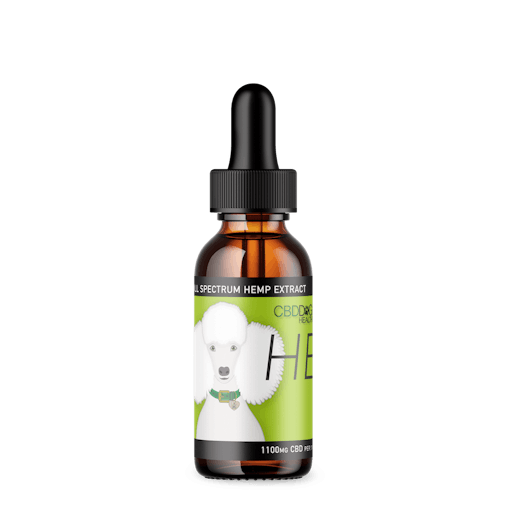
37mg CBD
CBD Dog Health’s Heal: CBD Oil for Dogs is a full-spectrum hemp extract specially formulated to support senior dogs. Each 1 oz bottle contains 1,100 mg of cannabinoids, including CBD, CBG, and CBN, derived from non-GMO, pesticide-free hemp. This oil is crafted with the issues facing aging pets in mind, targeting pain management, inflammation, and anxiety, as well as promoting better mobility and comfort. Formulated under veterinary guidance for optimal efficacy, consider Heal: CBD Oil for Dogs to help bring some extra brightness to your dog’s sunset years.
30 mL | Flavorless
Why you can trust Leafly Product Picks
Leafly is the world’s leading cannabis discovery platform and provides a vast library of content from some of the most respected voices in cannabis. Leafly Product Picks prioritizes accuracy and integrity in our selections, working through mountains of research and testimonials to source products you can trust.
Anna Elliott: Senior Content Editor, Brands & Products

Anna Elliott is Leafly’s Senior Content Editor, Brands & Products. She’s been with Leafly since 2021, managing and editing brand-related content and bringing the best stories on the industry’s top products to life. With a decade of experience reviewing products, covering brands, and editing stories, Anna loves talking up the people & products that make a real difference in readers’ every day. She’s found that Space Mints makes the perfect pairing for enjoying her frankly irresponsible vinyl collection.
For business inquiries, please direct messages to affiliate@leafly.com.










